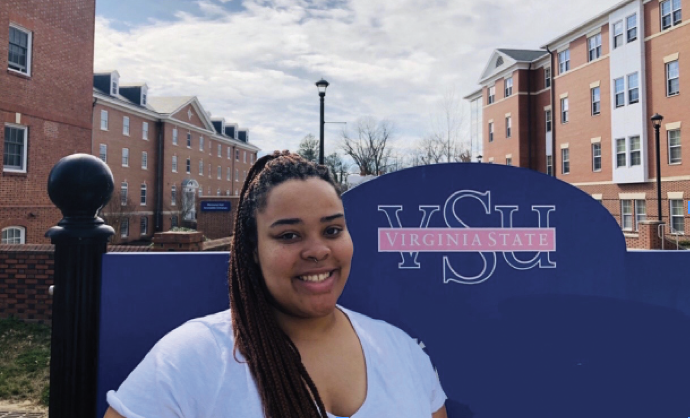Historically black colleges: ‘Hey, we’re here’
Photo Alana Hammond
Alana Hammond ‘19 at Virginia State University
During his Black History Month presentation to the WHS community, author and businessman Vaughn L. McKoy described how he “stands on the shoulders” of the trailblazing African American individuals that came before him.
While McKoy did not attend one, he mentioned historically black colleges and universities in his speech. HBCUs create opportunities for more than 298,000 students, some of whom are WHS alumni, to continue to stand on the shoulders of the strong African Americans before them.
Most HBCUs were formed after the Civil War to educate recently freed slaves, and the universities have only grown since then. With over 100 HBCUs across the U.S., African American students have the opportunity to learn in a more personalized community setting than a predominantly white institution (PWI) might provide. Called a “mecca for black excellence” by the Norwich Bulletin, many celebrities, lawyers, doctors and politicians are proud to call an HBCU their alma mater.
While the majority of WHS students are white, the school has a history of connecting African American students to HBCUs across the U.S.. Director of Guidance Maureen Mazzarese noted that the late Dr. Derrick Nelson attended Delaware State University, an HBCU, and he always emphasized the importance of exposing students to the opportunities that HBCUs provide. Some WHS teachers host a trip to an HBCU college fair in a local city each year, where students can speak with representatives and get a feel for the HBCU community during their application process.
Mazzarese said that many students attend HBCUs for the strong mentorship at the schools. Recent WHS alumna and Virginia State University student Alana Hammond (’19) said that her teachers truly want her to succeed, which adds to the community aspect. Now in her second semester of her freshman year, Hammond explained that her transition from WHS to VSU has “been different, [but] hasn’t been difficult.”
Hammond, in McKoy’s words, “stands on the shoulders” of other WHS alumni who continued their education at HBCUs, like WHS alumna Cordelia Harris (’68). She attended Central State University in Ohio during the black power movement and described her experience as “an awakening period.”
“It was an eye opening experience because [I] felt like the black experience had been kind of hidden [before attending an HBCU],” Harris said. “It strengthened me because [I was] coming of age and [I] really want[ed] to learn about [my] history.”
While WHS has taken more action recently to expose students to African American history through curriculum additions and Black History Month presentations, transitioning from a PWI to an HBCU brings more opportunities for African American students to connect with their roots.“If you don’t know where you came from,” said Harris, “you certainly don’t know where you’re going.”
WHS and Hampton University alumna Jamila Easton (’94) knew that an HBCU was “what [she] needed” after living in Westfield. “I was longing to have the opportunity to be in an institution where I was around more people that looked like me,” said Easton. “It gave me an opportunity to figure out who I was.”
Easton described how attending Hampton gave her the chance to “embrace her blackness” in a community-like setting. Similarly, Hammond discussed the amount of pride and understanding that takes place at VSU. “I think people are just less afraid of showing who they are because they know that we’re not going to judge them,” she said.
When it comes to the college application process, just knowing that HBCUs are an option is a great first start for any student. “My hope is that it’s not just the alumni that are always promoting the HBCUs,” Easton said. She says that it’s up to the school counselors, teachers and administration to make sure all students are aware of the opportunities that HBCUs can provide.
“Our education is just as important, so I think educating people [about HBCUs] and letting them know, ‘hey, we’re here’, can really get funding up and also get more people to come to HBCUs,” Hammond said.

